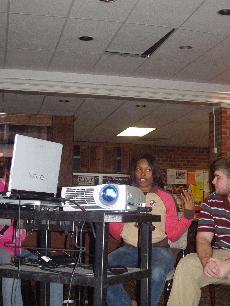I pounded my way into the Social Services Bureau with my two children in tow. They had not eaten in two days, and I was exhausted. Since my mother-in-law forced my family onto the streets the night before, life was desperate. I was looking for a job. Little did I expect an overbearing police officer, a maze of bureaucracy, bitter condescension, or the humiliation of my children watching the ordeal.
For one day, my name was Roberto. My experience was part of the campus-wide homelessness simulation, which concluded Guilford’s Poverty Week last Saturday.
In addition to letting students simulate the lives of homeless people, the week featured various panel discussions, movies and presentations – even a city housing tour – and was the biggest Guilford-sponsored series of events focused exclusively on poverty.
Multicultural Service Coordinator Sunny Matthews ’04 was the project’s chief organizer.
“Poverty Week was an opportunity for us to educate the college community: those who volunteer as to why they are needed where they volunteer, and those who don’t volunteer as to why they should volunteer,” Matthews said.
Students met with social activists and government agency representatives to discuss systemic causes of poverty.
“We have the mythology that if people work hard they will not be struggling economically,” said Barbara Zelter, Program Associate at the NC Council of Churches, who led a panel titled “Making Ends Meet.”
“The fact is, however, that you can work very hard, have two jobs, and still not make it. And this leads to all kinds of social problems. It is a grossly immoral system,” Zelter said. According to her analysis, 40 to 45 percent of North Carolinians live below the living income standard, as opposed to the official 17 percent.
Despite the prominent speakers and the grave issues discussed, the week had a low turnout of students.
“For me it is heartbreaking to see such a lack of care because I know how much time the students and the staff put into every event they sponsor,” Matthews said, “and when you walk in and it is you and just four or five others . In a way, this is telling to me what Guilford is becoming.”
Matthews remembers how she used to post fliers about a socially-conscious events the day they happened and had people crowding the room.
“If more than 50 people did not participate in the events, this tells me that Guilford doesn’t want to have this conversation,” Matthews said. “And if Guilford doesn’t want to have this conversation, how can we claim social consciousness?”
Director of Community Learning James Shields expressed his frustration with student participation.
“We have over 2,000 students at this institution, and it is frustrating when we have made a reputation off the back of a very small number of people,” Shields said.
According to Matthews, it is not enough to volunteer at a shelter or donate food and clothing.
“You need to know what systems or institutions need to be changed,” Matthews said. “Guilford students think that as long as they are doing their hours, they have done their part. The truth is that you have to be aware of the
reasons why you have to be serving there.”
A housing tour, for example, helped
students examine how race and class divisions have created gaping divides between
poor and rich neighborhoods in Greensboro. Day-to-day realities like the number of grocery stores and bus stops in an area, landscaping and playground
quality, and the presence of liquor,
Western Unions and bodegas, all help define the quality of life for different
neighborhoods.
Project Home Coordinator John-Wilson Irwin ’07 was among the few who rode the Guilford bus around the city last Wednesday.
“I learned how much I didn’t know about Greensboro,” Irwin said. “Before, I could have told you about all sorts of stuff that is going on in Bosnia, but I couldn’t have told you what is happening in Greensboro.”
Shields believes that students cannot confine their learning to talking about social problems in a classroom when half of America is living a pay-check away from being homeless.
“Going out into the community and getting its input is a crucial piece,” said Shields. “You are not solving this problem for the whole community. Even if it is just for
four years, Guilford students are part of this community, and they should care.”
“Working for social change, just like showing up for events, is a matter of personal accountability,” Matthews said. “If you change one person, you change the world for that person. Students don’t realize the power they have.

